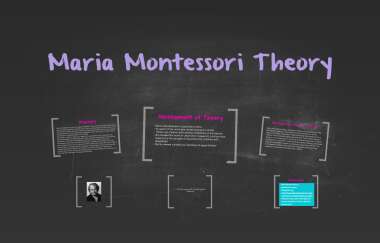What is Montessori Theory?
What is Montessori theory? This system of education was developed by physician Maria Montessori, who saw that formal teaching methods were not effective in developing young children’s interests and skills. Instead, it focuses on nurturing these natural talents and fostering a love of learning. The methodology is unique because it does not rely on any form of formal teaching techniques. A child is taught according to his or her own natural interests and needs. This approach is ideal for young children.

This approach has been proven to increase a child’s self-esteem and independence. Many schools now implement the Montessori method to teach adults and children of different ages. The idea is that children should be given the opportunity to help others and develop their own language mind. Through the use of the moveable alphabet, a child can see and experience how letters and words are made, which increases their self-esteem. And while this method may seem more advanced than conventional methods of education, it has many benefits.
One of the most important benefits of Montessori is the emphasis on learning through experience. The child absorbs language and other information from all around them, so a Montessori environment is geared towards the child’s developmental stage. This approach emphasizes that a child’s brain is not only developing in physical growth, but it also develops intellectually, so that it is able to learn more effectively. In addition to developing a child’s brain, the Montessori method promotes an appreciation for culture and learning, which is essential for life.
In a Montessori classroom, the child has the opportunity to participate in everyday activities. Using these activities, a child can gain confidence and discover how to take care of himself. It also helps develop a child’s self-esteem and independence. The Montessori materials are also designed to foster positive attitudes and help children grow into confident individuals. There are many benefits to the Montessori system, and the principles behind it are widely known. And the benefits of the method cannot be understated.
As a result of the Montessori educational philosophy, a child is free to develop his or her own interests. By observing a child’s natural curiosity and development, the child develops an interest in the world. Then, a Montessori student will be able to act boldly and think critically. In addition, a Montessori student will be able, for example, to work collaboratively with others in his or her class.
The Montessori method is based on the belief that children learn through play. In a Montessori classroom, a child is free to make choices and develop their own ideas. This is the best way for children to learn to be independent and to understand their own instincts. This model has become the standard of education for over a century. The concept of self-regulation, or “play,” is important for a child’s development.
The Montessori method has many benefits. It is beneficial to both children and parents. It encourages children to explore their imagination and develop skills. In addition to being free, Montessori classrooms are full of activities that allow the child to develop independence and self-esteem. As children grow, they will begin to learn language without any formal instruction. In essence, a child will become a responsible, self-directed adult. It will also develop a sense of justice, and respect for other people.
This theory is based on the observation that children are highly focused and a child’s natural interests are very important. Moreover, Montessori materials are designed in such a way that they will encourage a child’s natural social skills. By focusing on the children’s interests, materials should be age-appropriate. Hence, an individual child will learn more and become a better person through this process. The method was developed by a mother who was inspired by the philosophy of Maria Montessori.
The Montessori philosophy aims to educate children on four planes. The first plane is the child’s development. The second plane is their economic independence and the fourth plane is their social independence. The third plane, the one of human autonomy and responsibility, is the fourth plane. The three-plane theory was inspired by the idea that each person is different and should develop at different stages. The goal of a child is to foster his or her independence by providing them with the resources they need to be productive members of society.


